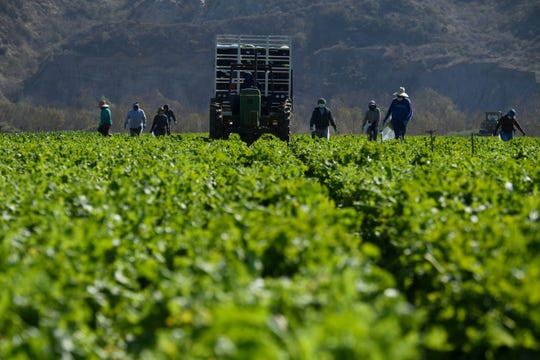Supreme Court conservatives turn skeptical eye on rule helping unions organize farmer workers
WASHINGTON – The conservative justices on the Supreme Court voiced skepticism Monday over a California regulation that permits union officials to enter farms at certain times of the day to organize workers – even if the farm owner doesn’t want them there.
A 1975 state regulation allows unions to meet with farm workers in California without an owner’s permission up to 120 days a year as long as they provide notification and don’t meet with employees during work hours. Two California fruit farmers sued, asserting the rule amounts to a government taking of their property without compensation, in violation of the Constitution.
Experts say the dispute could have broader implications than whether farm hands are unionized: At issue is the circumstances under which the government can require an owner to allow someone on their property – including for health and safety inspections.
“What do you do if there’s more than one union that wants access? I mean, it’s not – it’s not at all unusual for unions to be competing for representation. So does each union gets its own 120 days?” asked Chief Justice John Roberts during more than an hour of oral arguments.
Michal Mongan, California’s solicitor general, said that theoretically each union could have that time but that practically such disputes are unusual.
“You’re only allowed to come on when people are working there during non-work time, so I don’t know if it’s actually going to amount to year-round” visits, Mongan said.
The issue has drawn considerable attention from labor groups that were dealt a major blow by the Supreme Court three years ago. A divided Supreme Court in 2018 ruled that unions cannot collect fees from non-members to help defray the costs of collective bargaining. Those fees, permitted under a 1977 high court decision, violate the free speech rights of those who do not want to contribute, the court said at the time.
Now, conservatives ostensibly have a 6-3 majority on the court after Associate Justice Amy Coney Barrett was seated last fall.
Farmworkers wear face masks while harvesting curly mustard in a field on February 10, 2021, in Ventura County, California. (Photo: PATRICK T. FALLON, AFP via Getty Images)
The court’s liberal justices said there were bigger issues at stake, including the extent to which government could require inspectors to enter private property to, for instance, check the quality of food or whether safety protocols are followed in power plants.
“You are putting at risk all of the government regimes that permit – for nuclear power plants, there are inspections almost on a daily basis,” said Associate Justice Sonia Sotomayor.
But Joshua Thompson, who argued on behalf of the fruit farming companies, tried to draw a distinction between inspections and union organizing. The first, he said, has long been permitted under prior court decisions as serving a public interest.
“The property owner does not have the right to exclude the government when it undertakes that power,” Thompson said.
The Supreme Court is likely to rule in the case this summer.
“While there were challenging questions for both sides, we did not see indication that the court would abandon decades of constitutional law precedent to rule in favor of the agricultural employers,” Mario Martinez, general counsel for the United Farm Workers, said in a statement.
Source: Read Full Article

